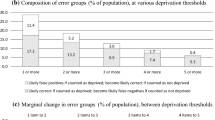Abstract
Both research and practical experience suggest that alternative forms of data analysis and presentation may affect their use in the policy arena. The variable-wise alternative produces estimates of population parameters through conventional statistical techniques. The case-wise alternative defines and identifies qualitatively distinct types of cases through techniques of numerical taxonomy. In the experiment reported here, variable-wise and case-wise presentations of Census data on poverty were used to compare the effects of the alternatives on policy makers in a priority-setting task. The results show that the case-wise alternative can improve utilization, assimilation, recall, and recognition of the data. Under the circumstances examined here, the case-wise alternative is a practical means of increasing the return on the public's investment in data resources to improve policy decisions.
Similar content being viewed by others
References
Breyer, J.M. and H.M. Trice (1982). ‘The utilization process: a conceptual framework and synthesis of empirical findings’, Administrative Science Quarterly 27: 591–622.
Brunner, R.D. (1983). ‘Case-wise policy analysis: Another look at the burden of high energy costs’, Policy Sciences 16: 97–125.
Brunner, R.D. (1986). ‘Case-wise policy information systems: Redefining poverty’, Policy Sciences 19: 201–223.
Brunner, R.D. (1987). ‘The principle of proximal similarity’, Knowledge: Creation, Diffusion, Utilization 9: 145–160.
Gilsinan, J.F. and L.C. Volpe (1984). ‘Do not cry wolf until you are sure: the manufactured crisis in evaluation research’, Policy Sciences 17: 179–191.
Kennedy, M.M. (1983). ‘Working knowledge’, Knowledge: Creation, Diffusion, Utilization 5: 193–211.
Lasswell, H.D. (1960), ‘The structure and function of communications in society’, in: W. Schramm (ed.) Mass Communications. Urbana: University of Illinois Press, pp. 117–130.
Lippmann, W. (1965). Public Opinion. New York: The Free Press.
McKelvey, B. (1978). ‘Organizational systematics: Taxonomic lessons from biology’, Management Science 24: 1128–1140.
Medin, D.L. and E.E. Smith (1984). ‘Concepts and concept formation’, Annual Review of Psychology 35: 113–138.
Moon, M. and E. Smolensky (1977). Improving Measures of Economic Well-Being. Institute for Research on Poverty Monograph Series. New York: Academic Press.
Murray, C. (1985). Losing Ground. New York: Basic Books.
Pear, R. (1984). ‘Rate of poverty found to persist in face of gains’, New York Times (August 3, 1984), p. 1.
Phillips, L.T. and K.B. Phillips (1984). ‘Research, politics, and the dynamics of policy development: a case study of motor carrier regulatory reform’, Policy Sciences 17: 364–384.
Rein, M. (1976). Social Science and Public Policy. New York: Penguin.
Rivlin, A.M. (1984). ‘A public policy paradox’, Journal of Policy Analysis and Management 4: 17–22.
Rosch, E. (1978). ‘Principles of categorization’, in: E. Rosch and B.B. Lloyd (eds.) Cognition and Categorization. Hillsdale, NJ: Lawrence Erlbaum Associates, pp. 27–47.
Rosch, E., C. Simpson and R.S. Miller (1976). ‘Structural bases of typicality effects’, Journal of Experimental Psychology: Human Perception and Performance 2: 491–502.
Simon, H.A. (1957). ‘Rationality and administrative decision making’, in: H.A. Simon (ed.), Models of Man. New York: Wiley, pp. 196–206.
Simon, H.A. (1983). Reason in Human Affairs. Stanford: Stanford University Press.
Sneath, P.H.A. and R.R. Sokal (1973). Numerical Taxonomy: The Principles and Practice of Numerical Classification, San Francisco: W.H. Freeman.
Sokal, R.R. (1974). ‘Classification: Purposes, principles, progress, prospects’, Science 185 (27 September 1974): 1115–1123.
Tversky, A. and D. Kahneman (1983). ‘Extensional vs. intuitive reasoning: the conjunction fallacy in probability judgment’, Psychological Review 90: 293–315.
US Department of Commerce, Bureau of the Census (1980). Characteristics of Population Below Poverty Line: 1980. Current Population Reports, Series P-60, No. 138. Washington, D.C.: US Government Printing Office.
U.S. Department of Health, Education, and Welfare (1976). The Measure of Poverty. A Report to the Congress as Mandated by The Education Amendments of 1974. Washington, D.C.: U.S. Government Printing Office.
Weiss, R.D. (1982). ‘Measuring the need for low-income energy assistance’, in: H.H. Landsberg (ed.) High Energy Costs: Assessing the Burden, pp. 121–125. Washington, D.C.: Resources for the Future.
Wittgenstein, L. (1972). Philosophical Investigations. Trans. by G.E.M. Anscombe. Oxford: Basil Blackwell. [Originally published in 1953.]
Author information
Authors and Affiliations
Rights and permissions
About this article
Cite this article
Brunner, R.D., Fitch, J.S., Grassia, J. et al. Improving data utilization: the case-wise alternative. Policy Sci 20, 365–394 (1987). https://doi.org/10.1007/BF00135871
Published:
Issue Date:
DOI: https://doi.org/10.1007/BF00135871




